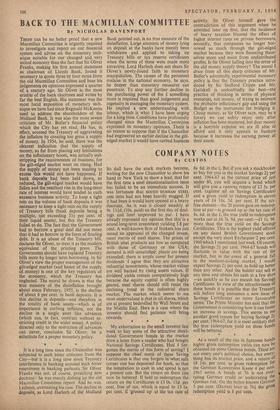BACK TO THE MACMILLAN COMMITTEE
By NICHOLAS DAVENPORT
THERE can be no better proof that a new Macmillan Committee is urgently required to investigate and report on our financial system and advise on the monetary tech- nique suitable for our changed and very mixed economy than the fact that Sir Oliver Franks, making his first annual statement as chairman of Lloyds Bank, found it necessary to quote three or four times from the old Macmillan Committee and base his judgements on opinions expressed a quarter of. a century ago. Sir Oliver is the most erudite of the bank chairmen and writes by far the best English. His statement was the most lucid exposition of monetary tech- nique we have had since Reginald McKenna used to address the shareholders of the Midland Bank. It was also the most severe criticism of Mr. Butler's financial policy which the City has yet read. He has, in effect, accused the Treasury of aggravating the inflation by creating too great a supply of money. In 1954, he said, there was the clearest indication that the supply of money, so far from placing any limitations on the inflationary boom, was actually out- stripping the requirements of business, for the gilt-edged market went on rising. Had the supply of money not been tending to excess this would not have happened. If bank deposits had been held down, or reduced, the gilt-edged market would have fallen and the resultant rise in the long-term rate of interest would hav6 tended to curb excessive business activity. To keep a tight rein on the volume of bank deposits it was necessary to keep a tight rein on the supply of Treasury bills (bank deposits being a multiple, not exceeding 33+ per cent. of their liquid assets), but this the Treasury failed to do. The fact that the Government had to borrow a great deal did not mean that it had to borrow in the form of floating debt. It is an abuse of the Treasury bill, declares Sir Oliver, to treat it as the modern equivalent of the printing press. The Government should have replaced Treasury bills more by longer term borrowing. In Sir Oliver's view the proper management of the gilt-edged market (and hence of the supply of money) is one of the key regulators of the economy, which the Treasury has neglected. The moral he draws is that the true measure of the disinflation brought about since February, 1955, is the decline of about 6 per cent, in bank deposits. It is this decline in deposits—and therefore in the totality of bank assets—which is of importance in curbing inflation, not the decline in a single asset like advances (which can, in fact, contract without re- stricting credit in the wider sense). A policy directed only to the restriction of advances can never, concludes Sir Oliver, be a substitute for a proper monetary policy.
It is a long time since the Chancellor was subjected to such bitter criticism from the City—but it is a long time since Treasury interference in banking aroused such bitter resentment in banking parlours. Sir Oliver Franks was not, of course, preaching new doctrine: he was mei ely dishing up the old Macmillan Committee report And he was, 1 submit, overstating his case. The decline in deposits, as Lord Harlech of the Midland Bank pointed out, is no true measure of the disinflation. Large amounts of money lying on deposit at the banks have merely been withdrawn and applied to taking up Treasury bills or tax reserve certificates when the terms of these were made more attractive. Lord Harlech does not share Sir Oliver's newly-found faith in monetary manipulation. The causes of the persistent malaise in the national economy, he says. lie deeper than monetary measures can penetrate. To stop any further decline in the purchasing power of the £ something more is required than good judgement and ingenuity in managing the monetary system. He implied a new. understanding with labour, which is what I have been urging for a long time. Conditions have profoundly changed since the Macmillan. Committee expressed its monetary opinions. There is no reason to suppose that if the Chancellor had'engineered an earlier decline in the gilt- edged market it would have curbed business activity. Sir Oliver himself gave the contradiction of this argument when he admitted later on first, that the incidence of heavy taxation blunted the effect of higher interest rates on private borrowers secondly, that companies no longer bor. rowed so much through the gilt-edged market because they were financing them• selves more and more from undistributed profits. Is Sir Oliver falling into the error of the old money supply theory? The moral 1 draw from all this sharp criticism of Mr Butler's admittedly, experimental monetary policy is that the Treasury practice intro. duced by Sir Stafford Cripps and Mr Gaitskell is undoubtedly the best—the practice of thinking in terms of physical resources, not money, of trying to estimate the probable inflationary gap and using the Budget as the instrument for bridging it. Cheap money, as Sir Oliver says, may be a luxury we can safely enjoy only after inflation has been mastered, but dear money is a horrible expense we are ill able to afford and it only appeals to bankers because it increases the earning power, of their assets.


































 Previous page
Previous page